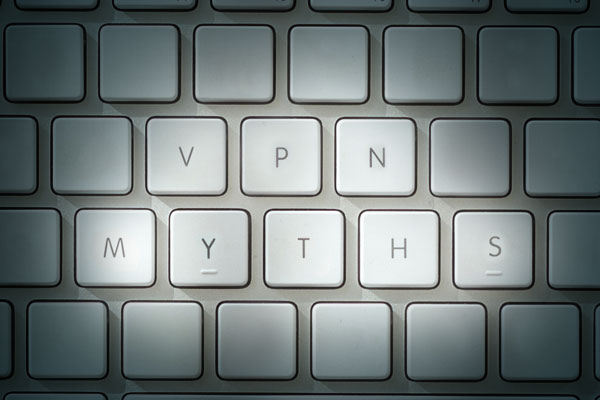VPNs are becoming increasingly popular online tools, and with good reason. Since revelations of mass government surveillance from WikiLeaks and Snowden, discussions on internet privacy and security are only getting louder, and in the growing noise, people are looking for solutions, like VPNs, to help take back their online privacy.
As with most discussions on the internet, there are almost always myths and falsehoods—VPNs are no different. Let’s cut through the chatter and bust the biggest myths still surrounding VPNs.
Myth #1: I don’t need a VPN if I’m not doing illegal things online
VPNs are tools that encrypt all your internet traffic, thereby protecting any and all data that you send through a Wi-Fi connection at home or in public. Using a VPN when you’re online ensures you’re browsing securely without the risk of hackers, ISPs, and government agencies poking into your private life.
Myth #2: VPNs slow down your connection
Funnily enough, VPNs can do the exact opposite and speed up your connection. With a VPN you can bypass an ISP that’s deliberately slowing down or “throttling” your internet traffic to help churn a greater profit for themselves.
Myth #3: Free VPNs are just as good
There is a general truth that if you’re not paying for the product, you are the product. This remains the case here, where free VPNs have been found to inject general and targeted ads into their products.
Free VPNs may also sell your data and snoop on you, as HotSpot Shield did in August 2017. Don’t trust a company that promises privacy with a free VPN. We’d recommend you go with a paid VPN that explicitly keeps a no log policy of their customer’s data.
Myth #4: VPNs are too complicated to set up
There are plenty of VPN apps, both paid and free, that require virtually no setup. Nowadays, you can download and setup a VPN in seconds without needing to know much about all the technology behind it. And if you do want to configure your VPN manually, you can find ample resources online.
Myth #5: All VPNs are the same
Several critical factors determine how good a VPN is at doing its job, like provider location, connection speeds, and level of encryption.
Make sure the VPN provider is located outside the Fourteen Eyes, offers OpenVPN—the most secure encryption system, and high connection speeds.
Myth #6: VPN offers complete anonymity
A VPN hides where you browse the internet from, which prevents you from being monitored by your ISP and your government.
But, while governments may not know what you’re using a VPN for, or where you’re now browsing from, they do know that you are using a VPN.
If you want to be completely anonymous online, use the TOR network or TAILS operating system to add to your defense. Other ways to reduce your digital footprint online are to use search engines that don’t track users like duckduckgo.com and using bitcoins for online transactions.
A VPN is designed to provide data security, not user anonymity. A skilled digital forensics technician can identify a user who tries to employ a VPN for nefarious purposes because the data still is being transmitted over the public Internet.
Myth #7: A VPN keeps you completely safe online
VPNs are not enough to protect your PC from malware and phishing attacks. While VPNs will encrypt your internet traffic, there is no defense against viruses or malware. Invest in good antivirus software to protect against them.
So there you have it—the seven biggest myths busted.
The truth about good VPNs
Whether you’re a student, small business, or concerned citizen that doesn’t want their government prying into your personal life, there are plenty of ways a VPN improves how you browse online.
Just keep these debunked myths in mind, and you’ll have no problem maneuvering passed them towards safer and more private browsing with a VPN.


Recent Comments